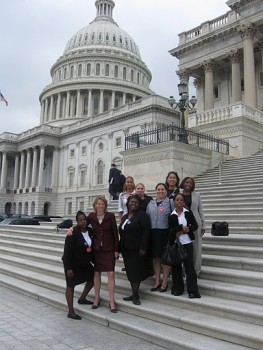Conference on Economic Human Rights Comes To Haverford

Dr. Mariana Chilton, second from left, with the Witnesses to Hunger on a trip to Washington, D.C., in May, 2009.
Details
Emily Edwards is strong, but she is struggling. The West Philadelphia mom has been out of work for three months and has a 2-year-old boy to feed, clothe and shelter.“It's very hard to deal with at this point,” she says.“I'll take from my mouth before I let him starve, so there are times when I won't eat because my son is hungry and he has to eat. Or there are times I'm cold just to make sure he's warm. It's very trying.”
But Edwards gets support from Witnesses to Hunger, a project she joined a year ago at the urging of her best friend. The program recruits low-income mothers and care-givers to take photographs of what hunger looks like in their neighborhoods and teaches them to advocate to make changes in their communities through speaking engagements and dialogues with policy-makers. And it's been a crucial lifeline for Edwards.“It's a sisterhood,” she says.“I can come and hear [people talk] about what I've been through without anyone judging me. It's a home away from home.”
Though many often think of the problems of people like Edwards as being social or economic in nature, Cara Curtis '10, a religion major and current Haverford House fellow, wants us to view them as human rights violations. That's why she created the “Human Rights: Right Here” conference, which is supported by the Haverford House fellowship and the Center for Peace and Global Citizenship. The Haverford House fellowship is a one-year program for six recent graduates of the College who are committed to social justice and volunteer action who live cooperatively in a West Philadelphia house while working with non-profit organizations in the city. Curtis has been working at the Philadelphia GROW Project and the Drexel School of Public Health on initiatives related to good nutrition and health for children and their families.
Curtis'“Human Rights: Right Here” summit, which will take place February 24 and 25 at various locations on Haverford's campus, aims to give a human rights framework to issues of domestic poverty, including hunger, migrant rights, housing, the death penalty and other issues of economic justice.“I recognized, as a very recent Haverford graduate, that there's a lot of interest in and commitment to social justice on campus and a lot of concern for issues of poverty and economic issues in Philadelphia, but there's not a whole lot of awareness of human rights as a tool that could be connected to that.”
Curtis says that in America we usually think of human rights as political ones—the right to not be imprisoned or tortured for one's beliefs, for example—but that the foundational documents of the human rights movement, like The Universal Declaration of Human Rights, which the United Nations adopted in 1948, also include language that promises all humans the right to work, to be educated, to be fed, clothed and sheltered.“I think the issue of dignity is really central,” says Curtis.“Every human has rights, and not just to not be imprisoned and to be able to speak freely, but to have food. Every human has the right to have housing… But it's an idea we've forgotten.”
Curtis' conference will include an opening presentation by Dr. Mariana Chilton, associate professor at the Drexel School of Public Health and the principal investigator for the Philadelphia GROW Project, and two panels: Human Rights and Grassroots Organizing in Philly and Placing Philadelphia in the National and Global Human Rights Dialogue. Speakers will include Galen Tyler of the Kensington Welfare Rights Union, Jesce Walz, an artist and grassroots activist, Renny Cushing, the executive director of Murder Victims' Families for Human Rights, Sarah Paoletti, an associate professor of law at the University of Pennsylvania Law School and founder and director of the Transnational Legal Clinic, Eric Tars ‘98, the director of human rights at the National Law Center on Homelessness and Poverty, and Emily Edwards, who will represent Witnesses to Hunger. She hopes, she says, that her participation in the conference will help put a face on the issues for Haverford students.
On the second day of the "Human Rights: Right Here" symposium, the College's campus will also play host to the John B. Hurford '60 Humanities Center-sponsored collloquium on disabilities and the arts, "In/Visible." Organizers have scheduled the two events so that those interested in the related topics may attend both. Says Curtis: "We were amazed by how much overlap there really is in thinking about human rights and dignity... so I think they fit together really well."
--Rebecca Raber



